Chapter 6: Landfall
The Resolute cut through the waves, forging boldly toward Antarctica.
The deck was slick with salt spray, the wind sharp and relentless. I spent hours at the rail, watching the gray-green water churn behind us.
As we sailed further south, the air grew colder.
I layered up—fleece, thermal long johns, a windproof jacket. The cold bit through anyway, the kind that seeps into your bones and never leaves.
Three days later, we entered the Antarctic Circle.
Someone rang a bell as we crossed the line. Old mariners’ tradition, I guess. We all cheered, the sound lost in the icy wind.
The icebreaker at the bow crushed thick ice into powder, making a tooth-aching, creaking sound.
Every time the ship shuddered, I imagined being trapped in the ice like the Endurance. The sound was relentless, a deep crunch that made conversation impossible on deck.
On the fourth morning, noisy discussion woke me from my sleep.
I’d barely closed my eyes when shouting started in the hallway. I sat up, rubbed my face, and groped for my parka.
Rubbing my eyes, I peered out the porthole and saw a white continent:
It was blinding—a blank sheet stretching to the horizon. A few dark rocks poked through the snow, and the sky was an endless blue dome.
Wilkes Land, Antarctica. We were about to make landfall.
My hands shook a little as I zipped up my jacket. This was it—the bottom of the world.
The captain’s voice came over the loudspeaker: All personnel, please put on cold-weather gear, goggles, and sun masks, and line up to take the dinghies ashore.
I fumbled with my gear, trying to remember every tip from the pre-expedition safety video. Someone nearby muttered about the sunburn you could get from snow glare this far south.
Antarctica has warm and cold seasons; November is the warm season, with coastal temperatures around 32°F. Even inland, the coldest spots are only minus 31—about the same as a winter in northern Minnesota.
I thought of my college roommate, who once ran a half-marathon in Duluth in January. I wondered if even he would think this was cold.
Dressed and ready, I joined the American expert team to disembark.
Boots crunched on metal, breath clouded in the air. For a second, it felt like marching onto another planet.
After days at sea, setting foot on Antarctic snow was a huge relief—finally, solid ground.
I knelt and grabbed a fistful, just to prove to myself it was real. The snow was so dry it squeaked underfoot.
Security teams from every country unloaded equipment, and, following prearranged groups, began survey work in an orderly fashion.
There was a military precision to it. Tripods, seismic sensors, and sample kits stacked neatly in the snow. Someone handed me a clipboard and a radio.
I was paired with a young expert from Texas named Danny Wu—his name’s a mouthful, so I just called him Danny.
Danny looked younger than me, with a shock of black hair peeking out from under his beanie and a perpetual grin. His accent was pure Houston, all drawl and easygoing confidence.
Danny fiddled with the snowmobile he’d just unloaded, then whistled at me:
"C’mon, Mark! Let’s get moving!"
His boots stomped a rhythm on the ice as he gunned the starter, grinning like we were at an amusement park instead of the edge of the world.
Continue the story in our mobile app.
Seamless progress sync · Free reading · Offline chapters